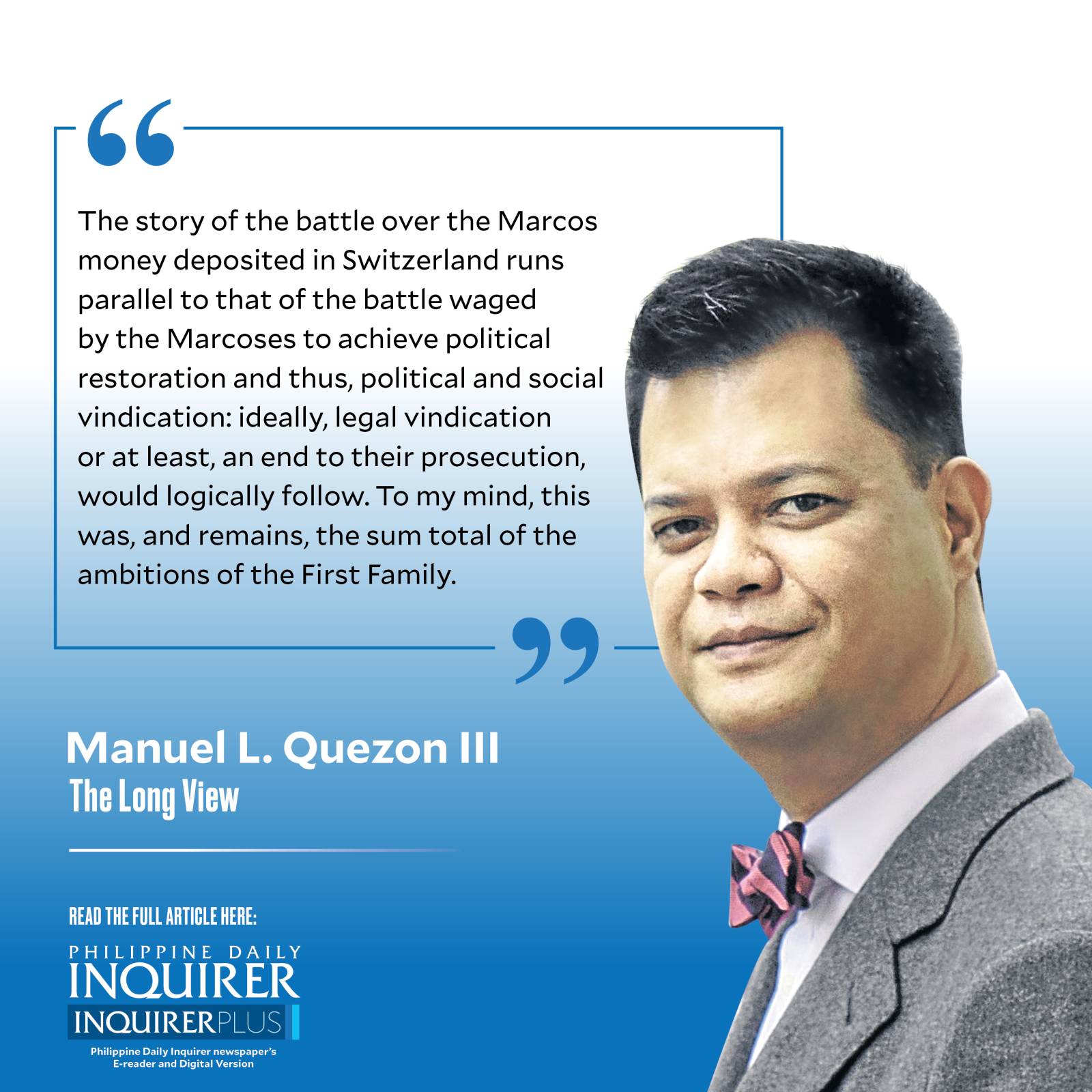Edsa in the post-restoration era
 In retrospect, the Restoration Era of the Marcoses was made possible by the European advocacy of human rights.
In retrospect, the Restoration Era of the Marcoses was made possible by the European advocacy of human rights.
It was the Swiss government’s insistence on the human rights of the Marcoses being respected, which included their being given the opportunity to confront their accusers in Philippine courts.
It was this condition that made it necessary for the Philippine government to allow the return of the Marcoses.
There is a kind of neatness in the President being perceived as putting a premium on wooing the European Union (for investments and the maintenance of favorable tariffs), to the extent that he is willing to psychologically, if not actually legally, imperil his predecessor by quietly allowing investigators from the International Criminal Court to come to the country and go about their business.
All of this took place in a political system meant to make it impossible for anyone to replicate Ferdinand Marcos Sr.’s rule. By the time his son, our current President, was elected to office in 2022, he’d served longer (20 years) under the Fifth Republic and its post-Marcos Constitution, than he had during his father’s New Society and Fourth Republic (six years). It is actually the political system he has come to know best and which he has arguably mastered: Ferdinand Marcos Jr.’s 58.7 percent majority in 2022 was not only the first majority mandate since 1986, it exceeded the first election of his father and came close to his reelection percentage (51.94 percent in 1965 and 61.47 percent in 1969).
The story of the battle over the Marcos money deposited in Switzerland runs parallel to that of the battle waged by the Marcoses to achieve political restoration and thus, political and social vindication: ideally, legal vindication or at least, an end to their prosecution, would logically follow. To my mind, this was, and remains, the sum total of the ambitions of the First Family.
What seems a cause of surprise and even friction within the President’s extended family is the moderation of this ambition: by this I mean, the political and social vindication that a Restoration by election provided; legal experts will have to figure out if an end to decades of legal cases will be another concrete manifestation of electoral absolution. An explicit revision of the national narrative is not yet included, beyond these implied achievements.
Even after trying to reduce things to a mere family feud hasn’t led to the abolition of Ninoy Aquino Day, the scrapping of the Edsa anniversary, the destruction of monuments, or the repealing of the law granting restitution to the victims of the dictatorship.
Now, the Edsa anniversary will become a time for the coming together of groups opposed to amending the Constitution, which tells us a thing or two about the democratic space that exists, the durability of factions and movements thought as entirely down and out, and the rickety, but surprisingly enduring, survivability of the political system no one seems to respect, admire, or even particularly, love, but which seems preferable to any effort by any subset of the political system, to change it. As I mentioned in this space last time, the whole Charter change debate has become predictable in its arguments and their inability to inspire, one way or another, an actual resolution of the problem everyone seems to sense, but no one has the confidence to risk trying to actually resolve: the inability of our political system to update itself or at the very least, modify.
Since it’s already much-abused, the often-cited quote of Karl Marx is useful here: “History repeats itself, first as a tragedy, second as a farce.” He was responding to another restoration, in his time: that of the dynasty of Napoleon, when the French Emperor’s nephew, Louis Napoleon, was elected president of France only to make himself emperor when thwarted in his ambition to extend himself in office. Napoleon III’s reign ended in defeat and exile—but after 22 years in power, and having made the country in many ways, modern, rich, and with a larger empire. I’ve argued before, that the Marcos Restoration became, in many ways, a banality, being preceded, as it was, by two others—the Macapagal Restoration in 2001 and the Aquino Restoration of 2010. A similar thing has just taken place in Indonesia, where the former son-in-law of Suharto, a general for decades under a cloud of human rights suspicion, achieved a landslide by being transformed into a cuddly old grandfather with the backing of a popular predecessor.
—————–
Email: mlquezon3@gmail.com; Twitter: @mlq3




















